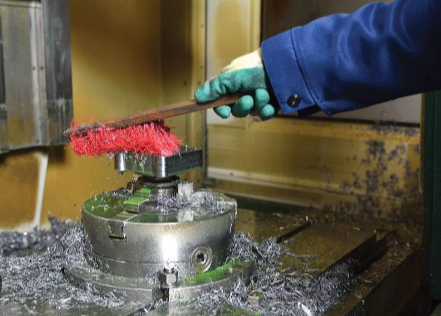The Essential Guide to Machinist Aprons: Function, Design, and Material

Machinist aprons are a vital part of the workwear arsenal for those who operate in machine shops, factories, and other industrial settings. These aprons, specially designed for machinists, offer protection against various hazards, including metal shavings, oil spills, and sharp tools. A well-crafted machinist apron is more than just a piece of protective clothing; it combines durability, comfort, and functionality to ensure machinists can focus on their tasks without worrying about their safety.
In this article, we’ll explore the key features of machinist aprons, their importance in the workplace, the materials they are made from, and what to consider when selecting the perfect apron for your needs.
The Role of a Machinist Apron
A machinist apron serves multiple purposes, primarily aimed at ensuring the safety and efficiency of the worker. Some of the key roles of a machinist apron include:
Protection Against Debris and Fluids: Machinists often work with machines that produce a large amount of debris, such as metal chips, shavings, or grinding dust. These particles can be sharp and dangerous if they come into contact with the body. Additionally, exposure to oils, coolants, and other industrial fluids is common. A machinist apron provides a protective barrier against these materials, preventing them from damaging clothing or causing harm to the worker’s skin.
Tool Accessibility: Many machinist aprons are equipped with multiple pockets, loops, and compartments. This allows machinists to carry essential tools and accessories on their person, ensuring they are always within easy reach. A well-designed apron can significantly increase efficiency by reducing the time spent searching for tools or walking to a toolbox.
Durability: Given the tough conditions in which machinists work, aprons must be made of durable materials. They are exposed to heat, sharp objects, and corrosive substances, which means the fabric needs to be strong enough to withstand wear and tear. A quality machinist apron ensures that workers can perform their duties without having to replace their aprons frequently.
Safety Enhancement: Some machinist aprons feature added layers of protection, such as flame-resistant materials, reinforced stitching, or even padding in key areas. These additional features help minimize the risk of injury, particularly when working with heavy machinery or in environments where sparks or hot surfaces are present.
Key Features of a Machinist Apron
When choosing a machinist apron, there are several essential features to consider. These features not only contribute to the apron’s overall functionality but also enhance comfort and safety for the wearer.
Heavy-Duty Material: Machinist aprons are typically made from heavy-duty materials like leather, canvas, or denim. Leather is especially popular because of its durability and resistance to heat and sharp objects. Canvas, on the other hand, offers flexibility and breathability while still providing solid protection. Denim is another robust option that combines durability with a classic look. The material should be thick enough to resist cuts and punctures but also flexible enough to allow free movement.
Pockets and Tool Storage: A good machinist apron will have multiple pockets for holding tools, nuts, bolts, and other accessories. Some aprons include loops for hanging tools like hammers, pliers, or screwdrivers. The placement and number of pockets can vary, so it’s important to consider your specific needs. Large, deep pockets are ideal for holding tools securely, while smaller pockets can be useful for storing items like pencils or measuring tapes.
Adjustable Straps: Since machinists often work long hours, comfort is a crucial factor. Many aprons feature adjustable straps or waist ties, allowing workers to customize the fit to their body. This ensures that the apron stays secure without being too tight or restrictive. Some designs also include cross-back straps, which distribute weight more evenly across the shoulders, reducing strain on the neck and back.
Reinforced Seams: Machinist aprons undergo constant wear and tear, so reinforced seams and double stitching are essential to prevent the apron from falling apart after extended use. The areas around the pockets and straps are particularly susceptible to damage, so these should be reinforced to ensure the apron’s longevity.
Flame Resistance: In environments where heat and sparks are a concern, such as welding or metalworking shops, flame-resistant aprons are a must. These aprons are treated with special coatings or made from materials that can withstand high temperatures without catching fire. This feature provides an extra layer of protection, particularly when working near open flames or hot metal.
Read more: Exploring the Evolution of Luffy’s Journey Through One Piece Figures
Common Materials for Machinist Aprons
The material of the apron plays a crucial role in its effectiveness and comfort. Here are some of the most common materials used in machinist aprons:
Leather: Leather is one of the most popular materials for machinist aprons because of its toughness and heat resistance. Leather aprons are durable and provide excellent protection against sparks, metal shavings, and sharp tools. However, they can be heavy and less breathable, making them less ideal for warmer environments.
Canvas: Canvas aprons are lightweight, durable, and provide decent protection against debris and fluids. They are more flexible than leather and allow for better airflow, making them a good option for machinists who work in hot or humid conditions. Canvas is also easy to clean and maintain, which is a plus in environments where oils and fluids are common.
Denim: Denim aprons offer a balance between comfort and durability. They are tough enough to resist wear and tear but lightweight enough to allow for flexibility and movement. Denim aprons often come with multiple pockets and storage options, making them highly functional for machinists.
Synthetic Materials: Some machinist aprons are made from synthetic materials like nylon or polyester. These aprons are often treated to be water-resistant or flame-retardant. While not as durable as leather or canvas, synthetic aprons are typically more affordable and lightweight, making them a good choice for light-duty work.
Choosing the Right Machinist Apron
When selecting a machinist apron, consider the specific needs of your work environment. Factors like the type of materials you handle, the tools you use, and the potential hazards you face will influence your choice. Here are a few tips to help you choose the best machinist apron:
Assess the Environment: If you work in a high-heat environment or deal with hot metal, prioritize flame-resistant aprons. For machinists working with sharp tools or heavy debris, leather or canvas aprons offer better protection.
Consider Comfort: If you wear your apron for extended periods, comfort is key. Look for adjustable straps, cross-back designs, and lightweight materials to ensure a comfortable fit without sacrificing protection.
Evaluate Tool Storage Needs: If you need quick access to tools, choose an apron with plenty of pockets and loops. The arrangement of the pockets should allow you to organize your tools efficiently without overcrowding.
Check for Durability: Reinforced seams, heavy-duty materials, and durable fastenings are essential for ensuring the longevity of your apron. A good Direct textile store should be able to withstand the rigors of your daily tasks.
Conclusion
Machinist aprons are indispensable for anyone working in machine shops or industrial settings. The right apron can make a significant difference in terms of safety, efficiency, and comfort. When choosing a machinist apron, consider factors such as material, tool storage, and the specific hazards of your work environment. With the right apron, you can work confidently, knowing you’re protected from the dangers that come with the job.




